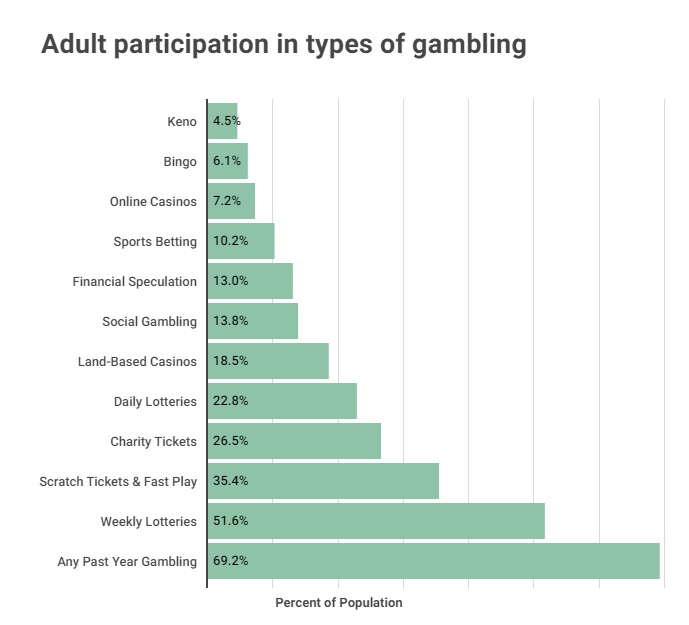By George Velky
March 2024
Connecticut’s first gambling study since 2009 concluded that more than 70% of bets made in 2023 were by a small fraction of problem gamblers.
People who recognize that they have a gambling problem can sign up for a “voluntary self-exclusion list,” said Kaitlyn Krasselt, director of communications at the Connecticut Department of Consumer Protection. This list prevents users from creating an account with the online gaming platforms in Connecticut, she said.
“When you’re putting yourself on that list you’re saying, “I need to take a timeout, I need to step away from this, and I need to put something in place that prevents me from being able to change my mind,””” said Krasselt.
Frank Piliero, a UConn senior and self-identified at-risk gambler, said he had never heard of a self-exclusion list. He said, “I feel like casino’s wouldn’t want you to know that exists.”
The Connecticut Department of Mental Health and Addiction Services paid Gemini Research to conduct the study. It found that 51% of all sports bets came from the 1.8% of the population that identified as problem gamblers.
Most of the total money spent on gaming in the state came from a small percentage of active gamblers as well. Gemini Research found that 75% of all gambling expenditure came from just over 5% of people who gamble in the state.
Krasselt did not know how much the study cost the department, but said a law was passed that mandated the study.
This was the first study that observed gambling in Connecticut since the state legalized sports betting in 2021. The data collected for the surveys of the population was gathered between January and August of 2023.
Three online sportsbooks are available in the state. FanDuel is partnered with Mohegan Sun, DraftKings, in association with Foxwoods, and Fanatics Sportsbook, which has an affiliation with the Connecticut Lottery Corporation (CLC) as of Dec. 2023, according to Fanatics.
Along with sports betting features, FanDuel and DraftKings have online casinos where users can play casino games such as blackjack, slots, roulette and more. Fanatics sportsbook does not have an online casino in Connecticut.

Sports betting accounted for 10.2% of gambling in the state in 2023, according to the study. The largest gambling mediums in 2023 were “any past year gambling” at 69.2% and “weekly lotteries” at 51.6%, according to the study. Sports betting ranked ninth.
When asked about the different kinds of gambling he’d participated in in 2023, Piliero said, “Basically anything under the sun.” Primarily, he said he played casino games in person and online, as well as online sports betting. “You can bet on anything nowadays, it’s messed up,” he said. “I bet on a Youtube livestream of a celebrity poker tournament.”
The sports betting gross gaming revenue was $178 million from October 2021 to June 2023, which projects to roughly $102 million over 12 months, according to the study. Online casino revenue was $416 for those same 21 months, which would equate to about $238 million over a 12 month period, the study said.
The money made by the CLC is allocated to the state’s general fund. Most of the tribal revenue is kept by the tribes, but Connecticut taxes online sports betting at 13.75% and online casino gambling at 18%, according to the study, so some of the tribal revenue does go to the state.
The state has a relatively average problem gambling rate of 1.8%, compared to 2.8% in New Jersey and 0.7% in New York (which was “anomalously low” because the study for that state was conducted during the COVID-19 pandemic, according to Gemini).
The study concluded that “treatment resources currently available are more than adequate to meet the demand,” for problem gamblers seeking help.
That being said, many problem gamblers were found to be hesitant when seeking help from other people. Over a quarter of problem gamblers who admitted they tried to get better on their own said they did so because they did not think that treatment would work. Piliero said, “Its because they don’t want to admit to someone else that they have a problem. You have to have a certain level of confidence to do that because it is such a demoralizing thing to do.”
Numerous resources and outreach programs in the state available for people struggling with gambling addiction. Krasselt mentioned the Connecticut Problem Gambling helpline as an easy place to start getting support.
She said, “The casinos in our state, as well as the gaming platforms themselves, they also offer resources.” They have their own self-exclusion lists, separate from state-provided ones. Users can subscribe to a self-exclusion list for one year, five years or a lifetime, according to Krasselt.
Piliero said the only resource he was aware of was the helpline.
Online gambling platforms are required to put preventative measures in place on their apps such as a timer that tracks how long users have been on their app, notifications when users spend a certain amount of money, and a function that logs users out after fifteen minutes of inactivity on the apps, according to Krasselt.
These measures are in place “so that people are really aware of how much time and money they’re spending on the platform,” Krasselt said. “That can help people recognize that maybe it’s been too much, and they need to step away.”
Krasselt also said that the department and the Connecticut Council on Problem Gambling (CCPG) “offer a lot of great resources.” The CCPG holds free awareness and prevention events online and in person all around the state, according to the CCPG website.
These organizations emphasize education and outreach to make sure people are getting information on responsible gambling. “We’re also in conversations with schools and universities to make sure that that information is getting to young people who are becoming eligible to sign up for these accounts,” said Krasselt.